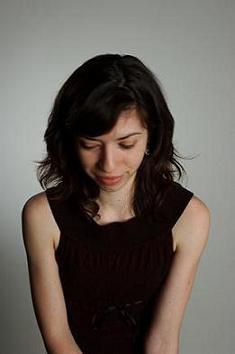Anaphora offers engaging premiere in an evening of new music

In a tiny arts space overlooking Wicker Park’s busiest thoroughfare, Anaphora presented the last installment of their contemporary series with a concert called “Sonorous Shades: Warm Tones.”
This small room of the Heaven Gallery would itself be a significant player on Wednesday night: To deliver this suggestively themed program, Anaphora co-founder Sarah J. Ritch requested a “comforting and intimate” space, and with the room awash in a lusty red glow you could argue the effect was achieved.
In addition to acting as evening emcee, composer-in-residence Ritch received a sterling world premiere performance of her absorbing Sonata de Kinor for Solo Violin (2011). Violinist Aurelien Pederzoli — another Anaphora co-founder — artfully executed the material and offered a compelling portrait of Ritch’s sound world.
The music begins with almost garishly drawn out vibrato-heavy passages, as if it were consciously in thrall to a great Romantic throwback. Pederzoli consistently projected his tone with care in this unconventional space.
Soon the music moves into a little lyric dance that is eventually turned on its head through variations on its theme. Ritch packs in plenty of emotional heft too, calling to mind a Sibelius-like arctic brooding. Underneath it all, scant remnants of Bachian backbone could be identified as well.
The second half of the sonata was a quick and sizzling movement that drew raucous applause from the audience. Ritch, a former punk and metal guitarist and bassist, writes with a deft, populist sensibility that is both engaging and challenging. She is a self-identified “mostly tonal” composer and her music pleasingly covers a wide territory.
In their inaugural season the Spektral Quartet already sounds like a long-experienced ensemble, and continues to make a strong impression on the local chamber scene. The foursome of impeccably dressed twenty-somethings etched a swirlingly seductive performance of Philip Glass’s beautiful String Quartet No. 2 Company (1984).
In accordance with the evening theme, this slow-simmering music filled the performance space as each distinct part of the quartet melded seamlessly into a whole. Whatever qualms one may have with Glass’s music, the textures in this quartet — as if they were illusorily independent of one another — were wholly intoxicating. The Spektral ensemble has a special knack for finding a satisfying balance of style, soul and seriousness.
The effervescent Glass prepared the palette for Virko Baley’s more substantive Centos for piano, clarinet, violin and cello (2008). The work has a Soviet flavor, albeit a chaotic one — a man sitting next to me called it “bombastic”– but the music’s percussive and effects-laden passages don’t come at the expense of a coherent artistic vision. The deeply elegiac third movement transformed into a smoldering love theme and clarinetist Cory Tiffin boldly showed his chops in several memorable passages.
Opening the night were brief selections from Augusta Read Thomas’s 6 Piano Etudes, incisively played by the enterprising George Lepauw (who also sat in on the Baley). Heavily pedaled and loudly resonant, these darkly contemplative snapshots—written over a decade from 1996-2005—each paid homage to composers like Morton Feldman, Luciano Berio and Pierre Boulez.
The evening was as much a success for its performances as its conception.
Posted in Performances


